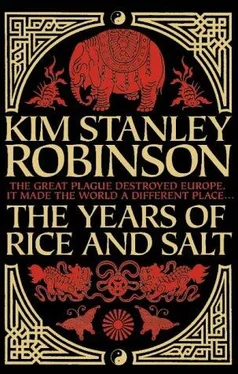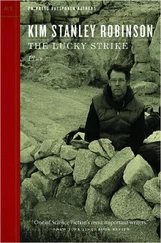Kim Robinson - The Years of Rice and Salt
Здесь есть возможность читать онлайн «Kim Robinson - The Years of Rice and Salt» весь текст электронной книги совершенно бесплатно (целиком полную версию без сокращений). В некоторых случаях можно слушать аудио, скачать через торрент в формате fb2 и присутствует краткое содержание. Год выпуска: 2003, ISBN: 2003, Издательство: Bantam Books, Жанр: Альтернативная история, на английском языке. Описание произведения, (предисловие) а так же отзывы посетителей доступны на портале библиотеки ЛибКат.
- Название:The Years of Rice and Salt
- Автор:
- Издательство:Bantam Books
- Жанр:
- Год:2003
- ISBN:0-553-10920-0
- Рейтинг книги:5 / 5. Голосов: 1
-
Избранное:Добавить в избранное
- Отзывы:
-
Ваша оценка:
- 100
- 1
- 2
- 3
- 4
- 5
The Years of Rice and Salt: краткое содержание, описание и аннотация
Предлагаем к чтению аннотацию, описание, краткое содержание или предисловие (зависит от того, что написал сам автор книги «The Years of Rice and Salt»). Если вы не нашли необходимую информацию о книге — напишите в комментариях, мы постараемся отыскать её.
The Years of Rice and Salt — читать онлайн бесплатно полную книгу (весь текст) целиком
Ниже представлен текст книги, разбитый по страницам. Система сохранения места последней прочитанной страницы, позволяет с удобством читать онлайн бесплатно книгу «The Years of Rice and Salt», без необходимости каждый раз заново искать на чём Вы остановились. Поставьте закладку, и сможете в любой момент перейти на страницу, на которой закончили чтение.
Интервал:
Закладка:
Then he turned his face up at the firelit branches over the two men, and cried again. He pulled up the rough shift covering his body, and pointed at his arms—at his underarms, where he made a fist. Bold nodded, felt his stomach shrink as the man mimed the sickness and death of all the children, by lying down on the ground and mewling like a dog. Then the wife, then all the rest. All had died but this man, who walked around the fire pointing at the leaf litter on the ground intoning words, names perhaps. It was all so clear to Bold.
Then the man burned his dead village, all in gestures so clear, and mimed rowing away. He rowed on his log for a long time, so long Bold thought he had forgotten the story; but then he ground to a halt and fell back in his boat. He got out, looking around in feigned surprise. Then he began to walk. He walked around the fire a dozen times, pretend-eating grass and sticks, howling like a wolf, cowering under his log, walking some more, even rowing again. Over and over he said the same things, “Dea, dea, dea, dea,” shouting it at the branch-crossed stars quaking over them.
Bold nodded. He knew the story. The man was moaning, with a low growl like an animal, cutting at the ground with a stick. His eyes were as red as any wolf’s in the light. Bold ate more of the rabbit, then offered the stick to the man, who snatched it and ate hungrily. They sat there and looked at the fire. Bold felt both companionable and alone. He eyed the other man, who had eaten both his fish, and was now nodding off. The man jerked up, muttered something, lay curled around the fire, fell asleep. Uneasily Bold stoked the fire, took the other side of it, and tried to do the same. When he woke the fire had died and the man was gone. It was a cold dawn, dew-drenched, and the trail of the man led down the meadow to a big bend in a stream, where it disappeared. There was no sign of where the man had gone from there.
Days passed, and Bold continued south. Many watches went by in which he didn’t think a thing, only scanning the land for food and the sky for weather, humming a word or two over and over. Awake to emptiness. One day he came on a village surrounding a spring.
Old temples scattered throughout,
Broken round columns pointing at the sky.
All in the midst of a vast silence.
What made these gods so angry
With their people? What might they make
Of a solitary soul wandering by
After the world has ended?
White marble drums fallen this way and that:
One bird cheeps in the empty air.
He did not care to test anything by trespassing, and so circled the temples, chanting “Om mane padme hum, om mane padme hum, hummm,” aware suddenly that he often spoke aloud to himself now, or hummed, without ever noticing it, as if ignoring an old companion who always said the same things.
He continued south and east, though he had forgotten why. He scrounged roadside buildings for dried food. He walked on the empty roads. It was an old land. Gnarled olive trees, black and heavy with their inedible fruit, mocked him. No person ate entirely by his own efforts, no one. He got hungrier, and food became his only focus, every day. He passed more marble ruins, foraged in the farmhouses he passed. Once he came on a big clay jar of olive oil, and stayed there four days to drink it all down. Then game became more abundant. He saw the vixen more than once. Good shots with his ridiculous bow kept him away from hunger. He made his fires larger every night, and once or twice wondered what had become of the man he had met. Had meeting Bold made him realize he would be alone no matter what happened or whom he found, so that he had killed himself to rejoin his jati? Or perhaps just slipped while drinking? Or hiked in the stream to keep Bold from tracking him? There was no way of telling, but the encounter kept coming back to Bold, especially the clarity with which he had been able to understand the man.
The valleys ran south and east. He felt the shape of his travels in his mind, and found he could not remember enough of the last few weeks to be sure of his location, relative to the Moravian Gate, or the khanate of the Golden Horde. From the Black Sea they had ridden west about ten days’ ride, hadn’t they? It was like trying to remember things from a previous life.
It seemed possible, however, that he was nearing the Byzantine empire, coming toward Constantinople from the north and west. Sitting slumped before his nightly bonfire, he wondered if Constantinople would be dead too. He wondered if Mongolia was dead, if perhaps everyone in the world was dead. The wind soughed through the shrubs like ghost’s voices, and he fell into an uneasy sleep, waking through the watches of the night to check the stars and throw more branches on his fire. He was cold.
He woke again, and there was Temur’s ghost standing across the fire, the light of the flames dancing over his awesome face. His eyes were black as obsidian, and Bold could see stars gleaming in them.
“So,” Temur said heavily, “you ran away.”
“Yes,” Bold whispered.
“What’s wrong? Don’t want to go out on the hunt again?”
This was a thing he had said to Bold before. At the end he had been so weak he had had to be carried on a litter, but he never thought of stopping. In his last winter he had considered whether to move east in the spring, against China, or west, against the Franks. During a huge feast he weighed the advantages of each, and at one point he looked at Bold, and something on Bold’s face caused the khan to jump him with his powerful voice, still strong despite his illness: “What’s wrong, Bold? Don’t want to go out on the hunt again?”
That earlier time Bold had said, “Always, great khan. I was there when we conquered Ferghana, Khorasan, Sistan, Khrezm, and Moghulistan. One more is fine by me.”
Temur had laughed his angry laugh. “But which way this time, Bold? Which way?”
Bold knew enough to shrug. “All the same to me, great khan. Why don’t you flip a coin?”
Which got him another laugh, and a warm place in the stable that winter, and a good horse in the campaign. They had moved west in the spring of the year 784.
Now Temur’s ghost, as solid as any man, glared reproachfully at Bold from across the fire. “I flipped the coin just like you said, Bold. But it must have come up wrong.”
“Maybe China would have been worse,” Bold said.
Temur laughed angrily. “How could it have been? Killed by lightning? How could it have been? You did that, Bold, you and Psin. You brought the curse of the west back with you. You never should have come back. And I should have gone to China.”
“Maybe so.” Bold didn’t know how to deal with him. Angry ghosts needed to be defied as often as they needed to be placated. But those jet-black eyes, sparkling with starlight—
Suddenly Temur coughed. He put a hand to his mouth, and gagged out something red. He looked at it, then held it out for Bold to see: a red egg. “This is yours,” he said, and tossed it over the flames at Bold.
Bold twisted to catch it, and woke up. He moaned. The ghost of Temur clearly was not happy. Wandering between worlds, visiting his old soldiers like any other preta… in a way it was pathetic, but Bold could not shake the fear in him. Temur’s spirit was a big power, no matter what realm it was in. His hand could reach into this world and grab Bold’s foot at any time.
All that day Bold wandered south in a haze of memories, scarcely seeing the land before him. The last time Temur visited him in the stables had been difficult, as the khan could no longer ride. He had looked at one thick black mare as if at a woman, and smoothed its flank and said to Bold, “The first horse I ever stole looked just like this one. I started poor and life was hard. God put a sign on me. But you would think He would have let me ride to the end.” And he had stared at Bold with that vivid gaze of his, one eye slightly higher and larger than the other, just like in the dream. Although in life his eyes had been brown.
Читать дальшеИнтервал:
Закладка:
Похожие книги на «The Years of Rice and Salt»
Представляем Вашему вниманию похожие книги на «The Years of Rice and Salt» списком для выбора. Мы отобрали схожую по названию и смыслу литературу в надежде предоставить читателям больше вариантов отыскать новые, интересные, ещё непрочитанные произведения.
Обсуждение, отзывы о книге «The Years of Rice and Salt» и просто собственные мнения читателей. Оставьте ваши комментарии, напишите, что Вы думаете о произведении, его смысле или главных героях. Укажите что конкретно понравилось, а что нет, и почему Вы так считаете.












